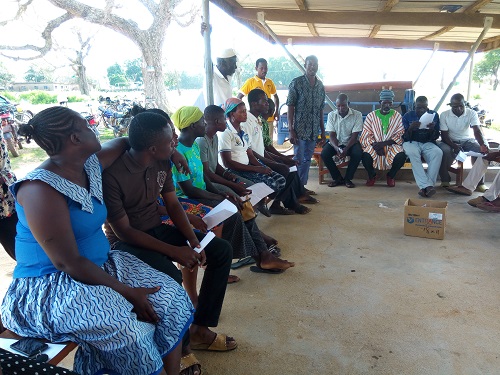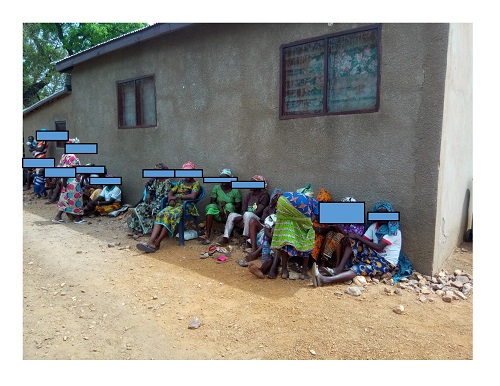Regional News of Friday, 28 July 2017
Source: starrfmonline.com
Married Women in Bongo sneak out for Family Planning
Married women at Namoo, a community in the Bongo District of the Upper East region, are sneaking out on their husbands to receive family planning services, Starr News has learnt.
Their husbands, according to medical practitioners in the area, frown strongly on the orthodox methods of birth control and women who tiptoe to a health facility to subscribe to planned parenthood in the community risk losing their marriage if it comes to their partners’ notice.
“The challenge we have with family planning is that the partners are not in agreement,” said a midwife at the Namoo Health Centre, Cynthia Sefa-Boakye. “The women patronise it, but most of them hide to do it. The husbands, because there are misconceptions about family planning, think that when you do it you cannot become pregnant again. The wives know the importance- that is why they hide to come and do it. They hide because if their husbands see it, it would bring some confusion in the house.”
The issue came to light at a stakeholders’ meeting organised Thursday in the community by the Integrated Youth Needs and Welfare, a non-governmental organisation headquartered in the region and mostly referred to by its acronym, INTYON.
The midwife added: “Most of them (the married women) don’t want to come in the morning when people are around because somebody would see and go and even tell the family. So, some prefer to come in the evening, or when they are returning from the market. They come and do and go."
The United Nations Children’s Fund (UNICEF) and the Ghana Health Service (GHS) have tasked INTYON to help reduce maternal and infant deaths in that district under a programme dubbed “Mother Baby Friendly Health Initiative (MBFHI)”. The organisation is set to do that in 42 communities by mobilising identifiable groups and sensitising them to support Maternal and Newborn Health (MNH). Thursday’s meeting, held to outline the details of the project to the target groups, only marked the start of the task ahead at Namoo.

Husbands abandon wives in labour
Of deep concern also to health professionals in the community is the neglect women reportedly suffer whilst in labour and the cold welcome they receive from their husbands if the newborn is a girl as compared to the unrestrained cheers that greet the birth of a male child.
“Some men are doing their best,” Cynthia Sefa-Boakye acknowledged. “But others, too, are reluctant. They think when you come, the fact that you are able to bear labour pains shows that you are a woman. They don’t know that once your husband is even with you, you feel relieved. What we now do is that we encourage birth companion. When you come, we ask of your husband. If it’s a male child you deliver, everybody would rush here. But some are left to their fate because they’ve delivered girls.”
The midwife told the story of a pregnant woman in the area who was compelled to farm because her husband did not care about her. She went into labour whilst farming and, with nobody by her side, she bled heavily without help. She managed to walk a distance alone, supporting her waist with both hands, until a motorcycle ambulance dispatched from the Namoo Health Centre after a distress call met her halfway.
“It was an eyesore. That is one of the numerous cases we encounter. The woman had already bled in the farm. As you could see, all her [clothes] were soaked with blood. We arranged for referral to the next level. Nobody came here. We had to follow up to the house. We enquired of the neighbours how we are going to get the family members.
"Upon all the men in the house, it was only an old lady who finally followed up to the health centre. Doctors had advised her against hard work because she had a special condition. But she had to go to the farm because of hunger and neglect. That is one of the numerous cases. Some go to our referral health facility and they have to call us to tell us that no relative has shown up,” she said.

Danger as nursing mothers use chalk, toothpaste on babies’ navels
One of the cultural practices INTYON is seeking to discourage in the target communities is the alleged use of chalk, toothpaste or concoction “instead of methylated spirit” on babies’ navels.
The application of unapproved stuff on the navel, according to the Executive Director of INTYON, Chief Issah Ibrahim, poses danger to the newborn.
“It’s a testimony from some women. One of such women we met said she tried it with her first child. Up to now, the child is still having problems with the navel. But when she delivered the second child and they gave her the spirit and she used it, the second child has no problem on the navel,” the Executive Director said.
INTYON says its communication and advocacy engagement with the 42 communities will focus on five areas.
These include: antenatal care and intrapartum care (care during pregnancy, labour and delivery) with more emphasis on facility delivery, postnatal care (care at the time of birth till 28 days of life) with more emphasis on the first 24 hours and first week of life, early initiation of breastfeeding and exclusive breastfeeding up to six months including lactation management, infant and young child feeding including care of the sick child and good hygiene practices and nutrition.
“It has come out that men do not want to accompany their expectant wives to facilities. We are going to see to it that this kind of behaviour is changed. We will sit with some of the men and also educate them to enable them show concern.
“The woman should breastfeed the baby exclusively for six months. But some of them still hide to give water. Because of that they come to the facilities with problems,” Chief Ibrahim remarked.











